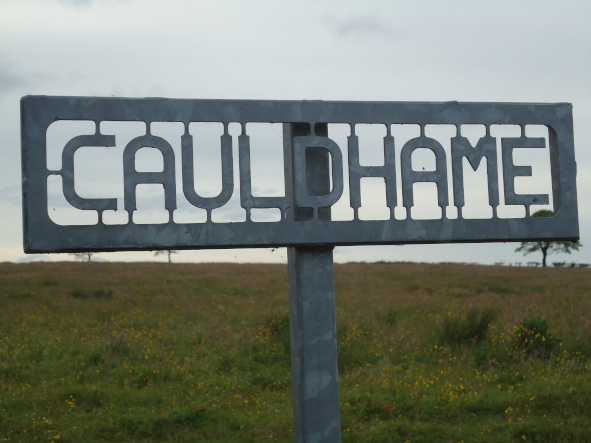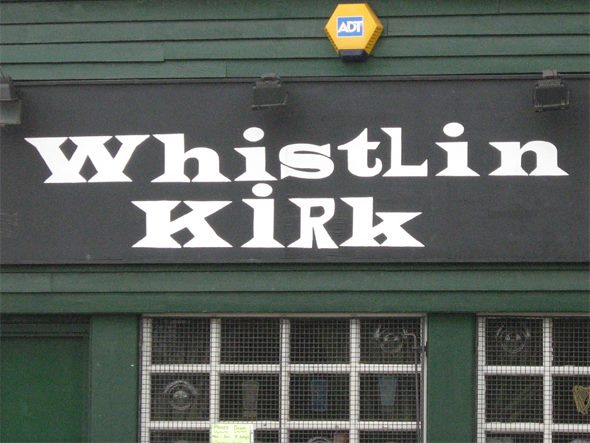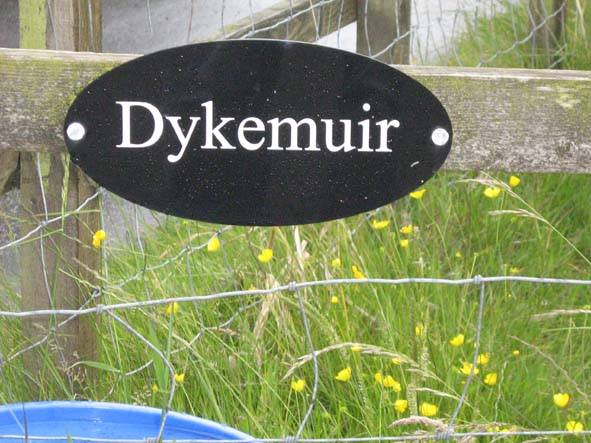Wir Ain Leed — West Central Scots
This is the dialect that the famous bard Robert Burns spoke.
Consonants
Consonants usually have the same phonetic values (pronunciation) in Scots, as in Standard English. For more detail see Orthography.
The grapheme <l> may be pronounced /j/ in words such as blue [bjuː], laik [jek] and plou [pjuː] etc.
Medial and final <ch> is usually /x/ in words such as bocht, loch and nicht.
Initial <ch> /ʧ/ in words such chap, chield, chirl and chowk.
The cluster <nch> is usually /nʃ/ in words such as brainch, clinch, dunch, hainch, inch and French.
The trigraph <tch> is usually /ʧ/ in words such as fleetch and wratch.
The trigraph <dge> is usually /ʤ/ in words such as begrudge, cadge, cruldge and fadge.
The graphes <g> and <ge> are occasionally /ʤ/ in words such as breinge and gigot.
The cluster <ld> is usually /ld/ but may be simplified to /l/ when the next word begins with a consonant, in words such auld, bield, cauld elder and fauld.
The cluster <nd> is usually simplified to /n/ in words such as daunder, find, haund, saund and sindry.
The digraph <ng> is usually /ŋ/ in words such as finger, hing, ingan and single.
The digraph <nk> is usually /ŋk/ in words such as bink and hank.
The digraph <qu> is usually /kw/ in words such as acquent, quair and queen.
The digraph <sh> is usually /ʃ/ in words such as creash and sheep. Root final that is occasionally /ʒ/ in words such as fushion and pushion.
The digraph <th> is usually /θ/ in words such as graith, thole and thrawn and /ð/ in words such as blether, thaim and thair.
The digraph <wh> is usually /ʍ/ in words such as wha, whan, wheech and wheel.
Vowels and Diphthongs
Vowels in unstressed positions are usually /ə/ in words such as aboot, the, oxter, duntit, bannock and smeddum.
Initial <a> is /ə/ in words such as ahint and awa etc.
The grapheme <a> is usually /a/ in words such as aff, lang, mak, watch and wash.
Final <a> is /ɔː/ or /ɑː/ and /a/ in and around Campbeltown, in words such as awa, twa and wha.
 Stewarton, East Ayrshire
Stewarton, East AyrshireInitial and medial <au> is usually /ɔː/ or /ɑː/ and /a/ in and around Campbeltown where the cluster <auld> may be pronounced /ʌul(d)/, in words such as auld, haud, haund, saul, saund and slauchter.
 Forth, South Lanarkshire
Forth, South LanarkshireFinal <aw> is usually /ɔː/ or /ɑː/ and /a/ in and around Campbeltown, in words such as aw, blaw, caw, draw, faw, gaw, gnaw, haw, slaw, snaw and staw. That occasionally occurs word initial or medial in, for example, awn, awfu, bawbee and bawsant.
Initial and medial <ai> is /e/ in words such as aik, aiple, ait, aith, braid, craitur, fain, gaither, graith and haimer, but initially is /jɪ/ in words such as aiblins.
The cluster <a-e> is usually /e/ in words such as face, gate, hame and Pace, but initially is /jɪ/ in words such as ale, ane, and ance.
Final <ae> is usually /e/ in words such as adae, brae, dae, f(r)ae, gae, sae, shae, tae v., tae n. and wae, ae may be /je/. However, <ae> is /ɪ/ in words such as daes (dis), daesna (disna) and daena (dinna).
Final <ay> is usually /e/ in words such as day, gray and lay.
The digraph <ea> is usually /i/ but /e/ in some words, such as beast, cheap, deave, east, heap, hear, meat, ream, sea and tea.
The digraph <ee> is usually /i/ in words such as dee, dree, eetem, freet, jeelie, keep, meet, teeth, weet and weel.
The digraph <ei> is usually /i/, /e/ in some words, such as beir, deid, heid, meidae, peir, spreid, teir and threid. Before /x/ it is /i/ in words such as dreich, heich, skeich.
The digraph <ie> is usually /i/ in words such as bield, chield, scrieve and shielin.
The grapheme <e> is usually /ɛ/ in words such as bed, ebb, esh, fecht, gled, gless, seck and wecht.
 Glasgow
GlasgowThe grapheme <i> is usually /ɪ/, that may be /ʌ/ before /kl/ and /tl/, in words such as drink, in, inch, licht, lift, pit, rin, simmer, sin and stibble. That is often /ʌ/ after /w/ and /ʍ/ in words such as whin, wirm, whisper, whit, wid, wind, wir, wird, wirm and wittins.
The graphemes <o> and <oa> are usually /o/ in words such as boat, boss, box, coal, cod, common, dochter, hoast, on, rock and thocht, however, it may be /ʌ/ in body and mony.
 Glasgow
GlasgowThe digraph <oo> is usually /u/ in words such as aboot, coont, droop, hoose, moose, oot, scoor and soond.
The digraph <ou> is usually /u/ in words such as allou, bouk, broun, coum, cour, doun, dout, poupit and thoum.
The digraph <u-e> is usually /u/ in words such as dule and hure.
The digraph <u> is usually /ʌ/ in words such as bund, burn, drunken, fund, grund, truff, unce and wund.
 Mauchline, East Ayrshire
Mauchline, East AyrshireThe digraph <ui> is /jɪ/ in initial short environments in words such as uiss, in medial short environments it is /ɪ/ in words such as abuin, bluid, bruit, cuil, cuit, duin, guid, fruit, muin, luif, luim, schuil, spuin and Yuil. In initial long environments it is /jeː/ in words such as uise and in medial long environments it is /eː/ in words such as abuise, buird, fluir, fuird, muir, muisic, ruise, and shuir.
The digraph <eu> is usually /jʌ/, in and around Campbeltown it may be /ʌ/, in words such as beuch, beuk, eneuch, heuk, leuch, leuk, neuk, sheuch, teuch and teug.
The digraph <ew> is usually /ju/ in words such as dew, few, spew and new.
The clusters <i-e> and <y-e> are usually /əi/ or /aɪ/, in and around Campbeltown it may be /e/ before /k/, in words such as advice, bide, bile, fine, fire, ile, rive, tyne, wise adj. and wyte.
The graphemes <ey>, <y> and <ye> are usually /əi/ or /aɪ/, in and around Campbeltown it may be /e/ before /k/, in words such as cry, eyntment, eyster, fley and kye.
The digraphs <oi> and <oy> are usually /oi/ in words such as Boid, foy, noise and ploy.
 Wishaw, North Lanarkshire
Wishaw, North LanarkshireInitial and medial <ow> is usually /ʌu/, that may be /oː/, especially before /k/, in words such as bowk, bowt, cowp, cowt, gowd, gowf, howk, gowpen, lowp and owsen. Root final that is <owe> in words such as flowe, glowe, growe, howe, knowe, lowe, rowe and towe.
Suffixes
Strictly speaking not a suffix, <ae> is usually /e/ in words such as Americae, airae, barrae, nairae, swallae and windae.
Diminutive <ie> is usually /e/ in words such as grannie, laddie, lassie, shappie and wifie.
Adjectival <fu> is usually /fə/ in words such as awfu, carefu and mensefu.
The negtive particle <na> is usually /nə/, however, /ne/ is spreading from the east, in words such as daena (dinna), haesna, maunna, winna and wisna.
Adverbial and adjectival <y> and <ie> are usually /e/ in words such as reekie, sairy, stany and stourie.
adverbial <ly> is usually /le/ in words such as brawly, feckly, fully, geyly, likely and uncoly.
Literature:
Wilson, James (1923) The Dialect of Robert Burns as Spoken in Central Ayrshire, Oxford University Press.
Mather, James Y. and H. H. Speitel (1986) The Linguistic Atlas of Scotland volume 3, London: Croom Helm.
Johnston, Paul (1997) "Regional variation" in Charles Jones ed. The Edinburgh History of the Scots Language, Edinburgh University Press, 443-513.
